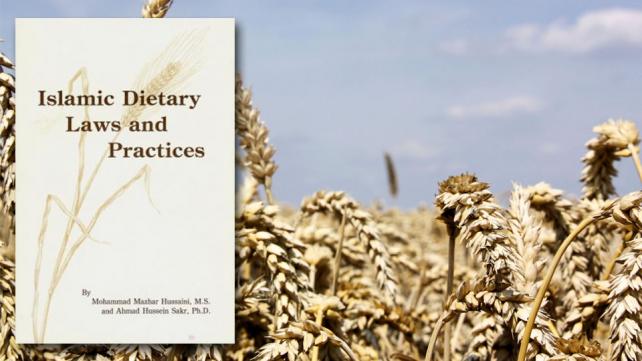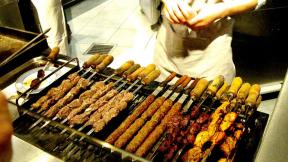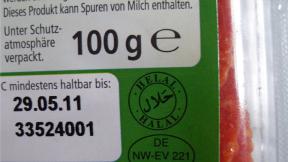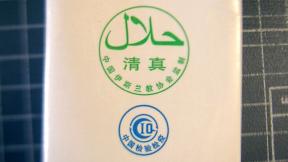
The lists of Halal and Haram food below have been taken with permission from the book 'Islamic Dietary Laws and Practices by Mohammad Mazhar Hussaini and M S Ahmad Hussein Sakr, Ph.D .
It should be noted that a product being imported from a Muslim country is not necessarily a guarantee that it is completely Halal. In fact, food is often imported from abroad into Muslim countries without proper checking of ingredients.
AN ALPHABETICAL DEFINITION GUIDE
An alphabetical list of Halal and Haram ingredients to look out for:
Bacon: A side of pig meat (pork).
Choletsorol: type of fat always of animal origin. If extracted from Zabiha animal, it is Halal.
Diglyceride: Emulsifier. If of animal origin it should be suspected till the source is known.
Gelatin (Jello Gelatin): Usually of animal origin, mostly from pig. If extracted from a dhabiha animal, then it is halal/
Glycerol (Glycerine): It could be of animal, plant or Glyceryl-Stearate synthetic origin. If animal source is used, it is suspected.
Hormones: Usually animal hormones are used for human consumption. One has to find out the source before passing a judgement.
Lard: Fat from swine particulaly found in the abdominal cavity. Totally Haram for us.
Magnesium Stearate (stearic acid): Used as an active ingredient in medicine tablets. Haram when derived from animal source.
Mono Glycerides: When derived from animal source. (Halal when the source is plant).
Pepsin: A digestive enzyme mostly from pig stomach.
Rennin (Rennet): A protein Enzyme. Usually not labeled. (In most cheeses).
Shortening: Fats and oils of animal origin. Animal/Lard
Vanilla: Extracted using alcohol.
Vitamins: Haram when from animal source. Mostly the source is synthetic or plant and are Halal.
Whey: Used in ice creams and yogurt. Haram when from animal source.
A PARTIAL LIST OF HALAL INGREDIENTS
S/N Name of Ingredients Code No Brief Description
Antioxidants: Chemical compounds used to protect certain food components from being destroyed or lost through oxidation.
Ascorbic acid: Vitamin C.
Benzoate (Benzoic acid): Benzoic acid and sodium benzoate are used for food preservation.
Biotin: A member of the B complex vitamins.
BHA: An antioxidant, preservative.
BHT: An antioxidant, preservative.
Citric acid: Sources are plant, usually of the citrus family. (e.g. orange, lime, lemon).
Cobalamine: Synthetically prepared Vitamin B12.
Dextrin: An emulsifying, sizing, and thickening agent.
Fiber: Sources are plant. Provide roughage to diet.
Fructose: Fruit sugar.
Gliadin (Gluten): Ptotein found in wheat and rye.
Hydrogenated oil: Vegetable oil being hydrogenated making it solid at room temperature.
Iodine: A nutrient for thyroid gland.
Lecithin: Emulsifier of fat. In the USA, sources are mainly soyabean and egg yolk.
Lipids : Essential fatty acids found in fish, plant and animals. If source is animal; it is suspected.
Malt: A kind of fermented grain.
Molasses: Syrup liquid obtained in refining sugar.
MSG: Flavoring. Imparts meat flavor to foods.
Niacin: One of the B complex vitamins.
PABA: A food supplement.
Pectin: A gelatinous substance extracted from fruits.
Propionic acid: A preservative.
Riboflavin: One of the B complex vitamins. Usually the source is synthetic.
Pure vegetable shortening: Source of this kind of shortening is plant.
100% vegetable shortening: Source of this kind of shortening is plant.
Sweetener: Substance that gives a sweet taste.
Thiamin: One of the B complex vitamins.
Vanillin: Flavoring agent, extracted from vanilla.
Vitamin A: If source are plant and synthetic, it is halal.
Vitamin C: Natural sources are from plant. (e.g. citrus fruit, tomatoes, etc).
Vitamin D: Natural sources are yeast and fish liver oil. Also synthetically produced.
Vitamin E: Rich sources of Vitamin E are vegetable oils. When source is synthetic, it is halal. If source is animal, it is suspected.
Water: The nutrient most vital to man's existence.
Food yeast: Microscopic, unicellular, fungal plant used for fermentation process and in baking bread.
Photo Attribution: "Weizen2" by Dako99 - Own work. Licensed under Creative Commons Attribution-Share Alike 3.0 via Wikimedia Commons - http://commons.wikimedia.org/wiki/File:Weizen2.jpg#mediaviewer/File:Weizen2.jpg








Comments
Many people confuse Gluten
Many people confuse Gluten with Gelatin.
yeah
i thought when it said gluten free it was gelatin free
Location
Halaal
Salaams.Is the color food gels halaal?
Location
your question Is the color food gels halal
Gel, gellation, or any type of gel,most commonly extracts form bones of animals ,hoof ,etc,except form the sea weed ,all such gel due to main source is animal and no control no one 100% sure that is produce through Halal source or under sharyah compliance and halal certified , so we can not use such things or say halal but if you find some food gel with sea or Ocean, source and with no contamination/ mixing of any other artificial source ,we can not use or say halal.
best regards
Mansoor siddiqui
Bismallah Halal certification
Halal service Manager
Location
It depends
I think it can be from natural and synthetic sources but it can also be from things such as insects. You should research the colours.
Location
Thank,s
Thank,s
Location
omg i nver knew half these
omg i nver knew half these things were haraam and LARD IS HARAAM i never knew and never hopefully will be using it again
Location
The vanilla is written under haram...how come vanillin extracted from vanilla is in halal list?
Location
Vanilla extract is made up of
Vanilla extract is made up of many compounds including vanillin AND alcohol.
Vanillin, being a part of vanilla extract, but far from the whole of it, has many fewer compounds, none of which are alcohol. In fact, most vanillin is completely synthetic anyway (still with no alcohol).
asak, i want to know whether noodles and lays are halal or haram.
Location
Pages
Add new comment